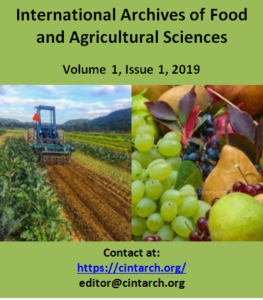
International Archives of Food and Agricultural Sciences (IAFAS), Website: https://cintarch.com/iafas-home/
September to October 2019 Vol 1(1): pp.11-16 DOI: https://doi.org/10.33515/iafas/2019.021/17
Copyright © 2019 C-International Archives
Original Article
Assessment of major vegetation zones in relation to associated fauna in Toungo sector of Gashaki Gumti National Park, Nigeria
Olalekan A. Akande1*, Ambrose A. Ihidero2, Toyese G. Akinade2, Babatunde S. Ojo2, Yusuf A. Ahmad3
1Department of Zoology, Ahmadu Bello University, Zaria, Nigeria
2Federal College of Wildlife Management, Forestry Research Institute of Nigeria, New-Bussa, Nigeria
3Department of Nutrition and Dietetics, Federal Polytechnic, Bauchi, Nigeria
Nigeria
*Corresponding Author’s Email: Akandehmd@gmail.com
Published October 31, 2019
ABSTRACT
Background: The study surveyed the fauna species in relation to the vegetation zone in Gashaka Gumti National Park, Nigeria. The method used involved both primary and secondary data sources. The primary source of data involved field survey using line transects of 5Km each laid systematically at each vegetation zones of the sector of the park while secondary data were obtained by review of related documents on the park. Data were subjected to SPSS version 20 for descriptive statistics. The major fauna species associated with Burkea africana wooded Savannah were Cercopithecus mona (Mona monkey) which recorded the highest proportion with 35.38%, followed by Cephalopus rufilatus (Red flanked duiker) with 20.00%, while Phataginus tricuspis (Pangolins) and Piping hornbill recorded the least with 3.08% each respectively. The animals associated with Afzelia Africana/Daniellia oliveri vegetation zone were Papio anubis (Baboon) which recorded the highest proportion with 33.33%, followed by Erythrocebus patas (Patas monkey) with 18.84% and the least was Syncerus cafer (Buffalo) with 1.45%. Among the fauna species associated with Prosopis Africana vegetation zone, Tragelaphus scriptus (Bushbuck) recorded the highest proportion with 30.0%, Cercopithecus aethiops (Tantalus monkey), Phacochoerus africanus (Warthog) and Ourebia ourebi (Oribi) recorded 20.00% each respectively, and Crowned eagle recorded the least with 10.00%. In the Accacia vegetation zone, Ptilopachus petrosus (Stone partridge) recorded the highest proportion with 54.29%, while Francolins bicalcarabus (Francolins) and Hippotragus equinus (Roan antelope) recorded 37.14% and 8.57% respectively. It is hereby suggested that adequate protection should be given to this area in order to prevent the extinction of the wildlife species in the park.

